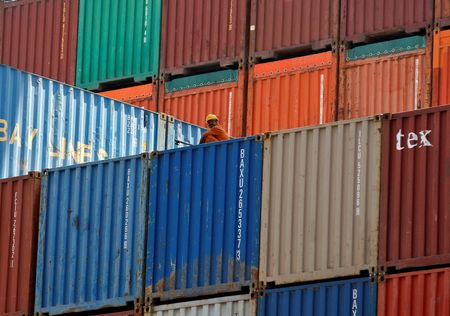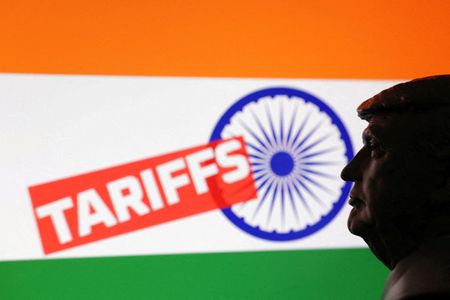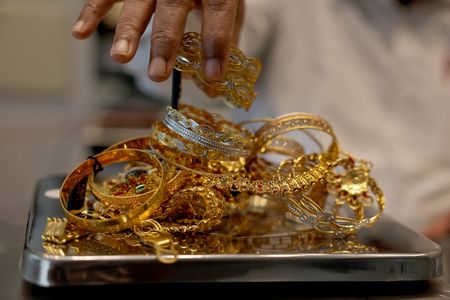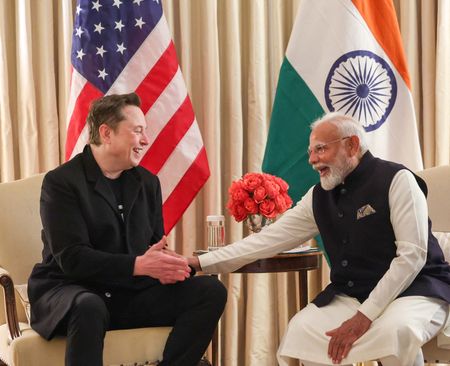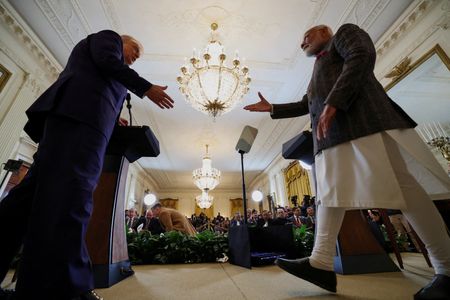WASHINGTON/NEW DELHI (Reuters) -U.S. President Donald Trump on Wednesday issued an executive order imposing an additional 25% tariff on Indian goods citing New Delhi’s continued imports of Russian oil, sharply escalating tensions between the two countries after trade talks collapsed.
The new measure raises tariffs on some Indian goods to as high as 50% — among the steepest faced by any U.S. trading partner.
The move is expected to hit key Indian export sectors including textiles, footwear, and gems and jewellery and marks the most serious downturn in U.S.-India relations since Trump returned to office in January.
It also comes as Indian Prime Minister Narendra Modi prepares for his first visit to China in over seven years, suggesting a potential realignment in alliances as ties with Washington fray.
“India will take all actions necessary to protect its national interests,” India’s external affairs ministry said in a statement, saying it was “extremely unfortunate that the US should choose to impose additional tariffs on India for actions that several other countries are also taking in their own national interest.”
It said India’s imports were based on market factors and aimed at energy security for its population of 1.4 billion.
Trade analysts warned the tariffs could severely disrupt Indian exports. The additional 25% tariff comes into effect 21 days after August 7, the order said.
“With such obnoxious tariff rates, trade between the two nations would be practically dead,” said Madhavi Arora, economist at Emkay Global.
Indian officials have privately acknowledged growing pressure to return to the negotiating table. A potential compromise could involve a phased reduction in Russian oil imports and diversification of energy sources.
A senior Indian official said New Delhi was blindsided by the sudden imposition of the new levy and the steep rate, as both countries continue to discuss trade issues.
Trump’s decision follows five rounds of inconclusive trade negotiations, which stalled over U.S. demands for greater access to Indian agriculture and dairy markets.
India’s refusal to curb Russian oil purchases — which surged to a record $52 billion last year — ultimately triggered the tariff escalation.
“Exports to the U.S. become unviable at this rate. Clearly, risks to growth and exports are rising, and the rupee may face renewed pressure,” said Garima Kapoor, economist at Elara Securities. “Calls for fiscal support are likely to intensify.”
Trump’s executive order does not mention China, which also buys Russian oil. A White House official had no immediate comment on whether an additional order covering those purchases would be forthcoming.
U.S. Treasury Secretary Scott Bessent last week said he warned Chinese officials that continued purchases of sanctioned Russian oil would lead to big tariffs due to legislation in Congress, but was told that Beijing would protect its energy sovereignty.
The U.S. and China have been engaged in discussions about trade and tariffs, with an eye to extending a 90-day tariff truce that is due to expire on August 12, when their bilateral tariffs shoot back up to triple-digit figures.
(Reporting by Doina Chiacu and Andrea Shalal, Manoj Kumar ; Editing by Caitlin Webber and Deepa Babington)

